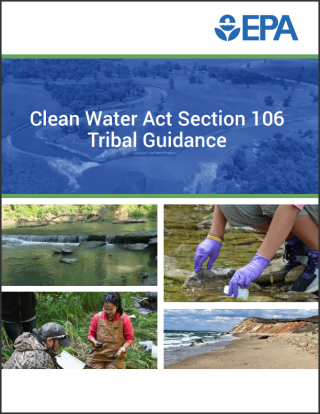Clean Water Act 106 Reporting Requirements Overview
Overview
The Guidance on Awards of Grants to Indian Tribes under Section 106 of the Clean Water Act (the Guidance) is intended to help Tribal water quality program managers, staff, and other Tribal environmental decision makers design and implement effective and successful water quality programs. It also establishes procedures and guidelines for EPA regions to consider when awarding and administering grants to federally recognized Tribes.
See also: Revisions to the Final Guidance
Reporting requirements and data management expectations for all Tribal programs are a key component of the Guidance. Tribes are developing Tribal assessment reports that contain information about water quality on Tribal land and demonstrate national results for the Section 106 Tribal program. A Tribal assessment report consists of the following:
- A description of the monitoring strategy;
- A water quality assessment (annual requirement); and
- Water quality monitoring data submitted electronically into EPA's Water Quality Exchange (WQX).
The Guidance is available on EPA's National Clean Water Act Tribal Section 106 program website, and the STORET-compatible Data Template (also referred to as the WQX Web Template) is available along with other resources at the STOrage and RETrieval and Water Quality eXchange and Water Quality Exchange Web Template Files websites.
If you have questions about these materials, please contact your Section 106 Project Officer.
Reporting Requirements
The documents below have been developed by HQ and Region 9 to assist Tribes in completing reporting requirements outlined in the Tribal 106 Guidance, and serve as additional tools for EPA and Tribal staff to use as they implement the Guidance. In addition to the materials on this page, the full guidance text, individual chapters (full color and print friendly), and supplements can be found at the Clean Water Act Section 106 Tribal Guidance website.
Tribal Assessment Modules
The Tribal assessment modules were developed to assist EPA and Tribes to present and learn information about water quality assessments and decisions.
1. Monitoring Strategy
This tool can be used to generate a rich text format (.rtf) road map document that will guide a Tribe in their effort to document and share water quality monitoring data.
You can also download the Excel based tool: E-Enterprise Tribal Roadmap for WQX Submissions (xlsm)
The Water Quality Portal (WQP) Data Discovery tool is a desktop application that provides an easy to use interface allowing users to search, summarize, QC and display data from the WQP.
- Guidance Supplement: Developing a Tribal Water Quality Program Monitoring Strategy (pdf)
- Clean Water Act §106 Water Pollution Control Program Monitoring Strategy Requirement (FY 2008) (pdf)
- Managing the Quality of Environmental Data (Quality Assurance Project Plan Guidance)
2. Water Quality Assessment Report (WQAR)
- Chapter 6 of Clean Water Act Section 106 Tribal Guidance (pdf)
- Water Quality Assessment Report Overview
- Region 9 Water Quality Assessment Report
- Region 9 WQAR Template (xlsx)
- 2011 Interactive WQAR Tutorial (PPSX) (ppsx)
- EPA Region 9 CWA §106 Water Quality Assessment Report Template Pilot (pdf)
- CWA 106 Water Quality Assessment Report Template: User Tutorial for Version 2010 (pdf)
- CWA 106 Water Quality Assessment Report Template (WQAR) Pilot: Frequently Asked Questions (pdf)
- Water Quality Assessment Report (WQAR) Template Webinar Materials
3. WQX Data
- Guidance Supplement: Tribal Data Management for WQX Submission (pdf)
Understanding Data Management
- Getting Started with Microsoft Excel: Organizing Your Water Quality Data (pdf)
- How Is Your Field and Lab Data Stored and Managed? (pdf)
- Water Quality Data Submission Tools Comparison (pdf)
- A Guide to the STORET/WQX Transition (pdf)
- Roadmap to Data Management (pdf)
Using the STORET/WQX Data Template (Tutorials and User Guide)
- Checking Your Data for Compatibility to STORET/WQX (pdf)
- Instructions For STORET/WQX Exercises (pdf)
- STORET/WQX Workshop 2008 Presentations
WQX Web Resources
- User Guide and Upload Resources
- Recorded WQX Web Webinars (YouTube Playlist Links)The following links exit the site
- WQX Web Webinar 1 (Preparing Your Data and WQX Web Rules)
- WQX Web Webinar 2 (WQX Web Template and Import Configurations)
- WQX Web Webinar 3 (Submitting Monitoring Locations/Results and Error Resolution)
- Water Quality Exchange Web Template files
- WQX Nutrient Data Best Practices Guide
- Fact Sheet: Tribal Water Quality Data Roadmap (pdf)
Fact Sheets on Water Quality Parameters
Water quality parameter fact sheets have been developed to provide an introduction to monitoring common parameters: Temperature, Dissolved Oxygen, pH, Turbidity, Macroinvertebrates, E. coli and Nutrients.

